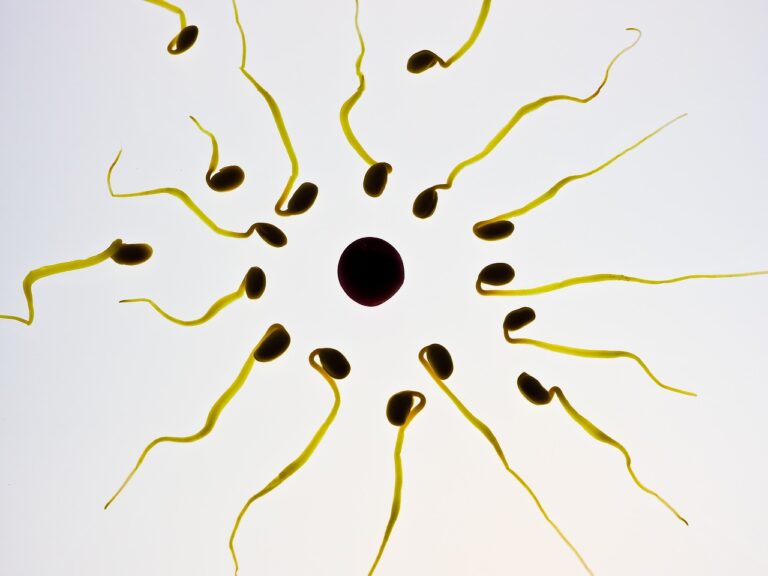Men can produce sperm into old age, and some men even have children in their 40s. However, the quality of sperm decreases as they age making it harder to conceive and increases the risk for passing on genetic defects in future children.
But unlike women, male fertility declines at a much slower rate. Men see a change in sperm count, morphology, and motility starting around the age of 35.
Count
The number of healthy sperm produced, known as the count, declines with age. The quality of sperm, measured by motility and sperm morphology, also decreases with age. While these changes aren’t usually a cause for concern, they may make it harder for a man to conceive, especially if they have been trying to start a family for some time.
The count and morphology of sperm also change due to health conditions and medications. Infections such as mumps, chlamydia, or urinary tract infections can leave scar tissue that blocks the delicate tubes that transport sperm from the testicles to the penis. Other medical problems, such as Peyronie’s disease or varicocele, can also impact sperm production. Chronic diseases, such as diabetes and high blood pressure, and certain medications can also reduce sperm production or make it impossible for men to produce semen.
Many men still ejaculate at an acceptable volume and trajectory into the orifices as they age, but their sperm count and sperm quality may not be what it was in younger years. If a man notices that their erections are no longer firm and that their sperm have the consistency of coiled garden hoses, they should consult a fertility specialist to see what is going on.
Men can still conceive children at any age, but their chances of a successful pregnancy diminish with each year that they go over 40. Fertility specialists can help men improve their sperm count, which will increase the likelihood of a successful pregnancy. A low sperm count may be caused by an infection or medication, and a healthcare provider can diagnose these issues. A dietary supplement, such as ashwagandha (Indian ginseng), has been shown to improve sperm production. It is available in health food stores and online.
Morphology
While men don’t have the same biological clock that women do, they do experience a gradual decline in fertility as they age. This is typically due to a decrease in semen volume, sperm count and motility. However, this doesn’t mean that a man cannot father children. The oldest man to father a child was 92 years old.
The quality of a man’s sperm can be affected by many factors, including genetic mutations. These genetic mutations can be caused by exposure to radiation, infection, high body temperature and lifestyle habits such as smoking and alcohol use. Men can take steps to improve sperm quality, such as maintaining a healthy weight, avoiding foods that are high in fat and sugar and sleeping for at least eight hours per night.
Additionally, a man’s sperm can also be damaged by oxidative stress. This occurs when the free radicals in the body are out of balance with the antioxidants that normally keep them in check. Certain health conditions, such as heart disease and diabetes, are known to increase oxidative stress in the body, which can reduce sperm quality. Additionally, smoking and excessive alcohol consumption can significantly reduce a man’s sperm quality. The good news is that it is possible to increase sperm quality by eating a diet rich in nutrients, reducing alcohol and nicotine intake, and exercising regularly.
Motility
While men can theoretically continue to father children all the way into their 90s, it’s true that sperm production declines as a man ages. During this process, known as andropause, a gradual loss of semen volume and quality occurs. Though it is still possible to conceive in your 50s and beyond, it will take longer for a couple to conceive than if they were younger.
The motility of a man’s sperm is also affected by the natural aging process. A decrease in sperm motility can hinder a man’s ability to fertilize an egg, making conception more difficult. Motility is affected by a variety of factors, including the shape and structure of sperm and its ability to swim.
Certain medical conditions can also affect a man’s sperm motility. For example, medication like selective serotonin reuptake inhibitors (SSRIs), tetracycline, and penicillin may suppress the production of healthy sperm. Marijuana use and a diet high in saturated fats can also reduce a man’s sperm motility.
Fortunately, many of these factors can be addressed. Regular exercise, a healthy diet, and abstaining from smoking can all improve a man’s sperm motility. In some cases, fertility treatments like sperm donation can be the best option for men who are concerned about their sperm count and motility. Often, these techniques can be successful in helping a man and his partner conceive.
DNA Fragmentation Index
The delicate DNA that sperm transports through the reproductive tract is compacted into tiny sperm cells along with protein structures that protect it to form a structure called chromatin. Unfortunately, DNA damage can occur in a process known as DNA fragmentation. When this occurs, it makes the sperm less viable. A high level of fragmentation can significantly reduce a man’s fertility potential and is correlated with low concentration, motility and morphology on a routine semen analysis.
There are several tests that measure sperm DNA fragmentation. They each use slightly different methods, but the general idea is to treat the sperm with a chemical dye, so that broken sperm DNA turns red and normal sperm DNA turns green. Software then categorizes a sample of about 5,000 sperm cells and gives an estimate of the percentage of damaged sperm, called the DNA Fragmentation Index (DFI).
Research shows that men’s DFI increases as they get older. This could be due to a number of factors, including oxidative stress and the accumulation of damage in the testicles over time. Interestingly, upping your antioxidant intake in the form of foods and supplements has been shown to decrease sperm DNA damage.
Although it is difficult to put a number on a specific DNA fragmentation threshold that indicates a man is at risk for subfertility, experts agree that a DFI of 30-50% is high and should be considered when evaluating a man’s fertility. The good news is that a man’s DFI can improve dramatically, even in the face of other abnormal semen parameters, when he takes steps to optimize his health and reduce his exposure to toxins.
See Also:



